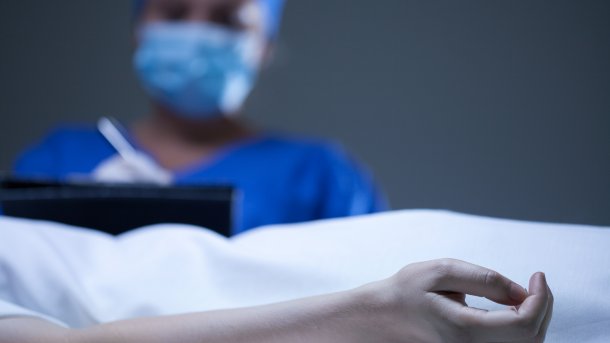National autopsy register for interdisciplinary research
Autopsy data helps to understand diseases. The German register for COVID-19 autopsies is the basis for the national autopsy register.

(Bild: ESB Professional/Shutterstock.com)
Post-mortems help to improve our understanding of diseases and pathogens and the damage they cause to organs, tissue and cells. To date, there is no standardized national database that records all clinical autopsies in Germany. In future, data on autopsies can be collected in the National Autopsy Registry (NAREG) to help with research and knowledge transfer in disease management, patient care and therapy.
Employees of the University Hospital RWTH Aachen and the University Medical Center Hamburg-Eppendorf report in a publication on the development and progress of the National Autopsy Network (NATON). The rapid electronic recording of autopsy data and continuous central monitoring of this data enables new types of diseases and their spread to be identified more quickly. If necessary, pathogens could also be characterized more quickly through systematic autopsies. NAREG also aims to further improve cooperation at national and international level.
Knowledge from autopsies helps the living
Initial experience with an autopsy register was gained during the coronavirus pandemic with the German Register for COVID-19 Autopsies (DeRegCOVID). The data collected and analyzed in DeRegCOVID formed the basis for the world's largest national multicenter COVID-19 autopsy study to date. The study was based on data from over 1,100 autopsies. It provided insights into the pathophysiology and progression of the disease. This knowledge could then be used for patient care and treatment.
The German Research Network for Postmortem Examinations in Pandemics (DEFEAT PANDEMIcs) emerged from this first autopsy registry and developed into the National Autopsy Network (NATON) (https://naton.network/). NATON aims to promote networking and knowledge transfer between pathology, neuropathology and forensic medicine. To this end, NATON provides a data and methods platform for networked autopsy-based research. In addition to infectious diseases and pandemic management, NATON is designed in principle for all autopsy-driven projects and use cases. The data for such projects could come from NAREG in the future.
Development of a modular autopsy registry
NAREG will be launched in August 2023 and will be operated as a central registry in an ISO 27001-certified data center. Users will have web-based access that is secured via two-factor authentication. Data is transmitted via a TLS-encrypted connection. Data is only transmitted electronically. All samples taken as part of the autopsy remain decentralized in the respective autopsy center and are stored there.
So far, 33 university and six non-university centers have participated. Although it is a national registry, two Austrian international centers have also been part of it since 2023. NAREG consists of the core autopsy dataset and other connected modules that cover pathological topics. Autopsy data is recorded in a standardized manner using a core dataset. REDCap is used as the software for data acquisition. The core data set of the autopsied deceased contains information on gender, age, cause of death, findings and clinical data.
DeRegCOVID, which served as the basis for the development of NAREG, is now one of the modules connected to the core dataset. In addition, there is the "metastatic cancer" module, the "ICU" module and the "Borna viruses" module.
Gold standard for clinical quality assurance
Traditional autopsies are considered the gold standard in post-mortem diagnostics and can support clinical quality assurance in medicine. However, the autopsy rate in Germany has been falling for years and is low compared to other countries. Nevertheless, findings from NAREG could generally help with clinical quality assurance and the implementation of corresponding measures in hospitals. At present, however, the handling of deceased persons' data has not yet been properly clarified.
Consent by the deceased's legal guardians
Normally, the person's consent to a post-mortem examination is not obtained prior to death. If doctors wish to carry out an autopsy for pathological or clinical reasons, they must obtain the consent of the next of kin entitled to care of the deceased. A clinical autopsy can only be ordered by the public health department against the wishes of the next of kin in certain cases. Forensic autopsies of non-natural deaths are a special case. In such cases, the public prosecutor's office decides whether to carry out the autopsy.
(nie)